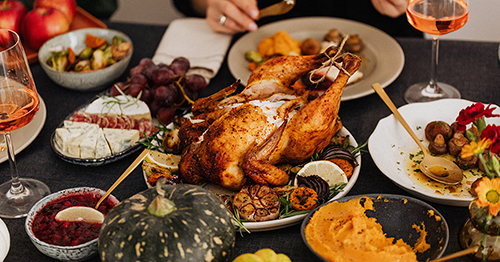
Many find eating around the holidays to be stressful or confusing. Constant availability of sweet treats and traditional seasonal favorites can be tempting and result in overconsumption of food and overall holiday weight gain. Christine Garner, Ph.D., RD, a registered dietician and a Texas Tech University Health Sciences Center (TTUHSC) assistant professor in the department of pediatrics, says holiday eating doesn’t have to be stressful.
“You have the power to make your own eating choices that are right for you and conducive to happiness and healthfulness,” she says. “Be aware of what you are eating. Knowing approximately what is in the foods you are eating can help you make decisions that are right for you and that will lead you to healthful choices.”
Garner says people should watch holiday beverage intake. Lattes and cocktails are loaded with added sugars. Some holiday lattes have up to 50 grams of sugar, and a single cocktail may have up to 400 calories – that’s as much as a sandwich.

“Awareness of the sugar or calories in foods can help you decide whether it’s worth it to you to have that food, or whether you’d rather spend those 400 calories on a satisfying and satiating meal,” she says.
Focusing your attention on nutrients is another great way for people to stay on track during the holidays. Garner says adults should eat at least five servings of vegetables and fruits per day and should focus on whole grains and healthy proteins like legumes and fish. These are all important foods that Americans often need to consume more.
“We tend to eat too much added sugar and saturated fats,” Garner says. “Focus your attention on getting important nutrients by filling half your plate with vegetables and fruits, and choosing whole grains at least half the time. The more healthful foods you put on your plate, the less space there is for less healthful foods. If you are at a party, fill half of your appetizer plate with veggies, or half of your dessert plate with fruits.”
Garner recommends that people respect their hunger and honor their fullness. Avoiding eating or skipping a meal before going to a party is a common practice to save calories, but unfortunately, this strategy tends to backfire.
“Skipping meals results in an over-hungry state which can lead to overeating and consuming more foods high in fat or sugar,” Garner says. “Respect your hunger by eating small meals or healthy snacks before a party; this can help you resist tempting foods and make healthier choices in group settings.”
Similarly, Garner says honoring your fullness is important to avoid overeating. There is a lag between eating a meal and the brain’s recognition of fullness, so eating slowly and waiting at least 20 minutes before seconds can help give your body time to recognize that you have had enough to eat.
“Be kind to yourself. You can still eat your favorite foods and even dessert during the holidays,” Garner says. “After all, special foods can be an important part of holiday celebrations. Make these choices mindfully and intentionally, and take smaller portions. You can be kind to yourself by choosing to have your favorite dessert, but not standing next to the food table at a party to avoid mindless, unintentional eating.”
For more information on healthy eating guidelines, visit the CDC website.
![]()
